NBA Finals MVPs Per Position: This Is A League Of Small Forwards
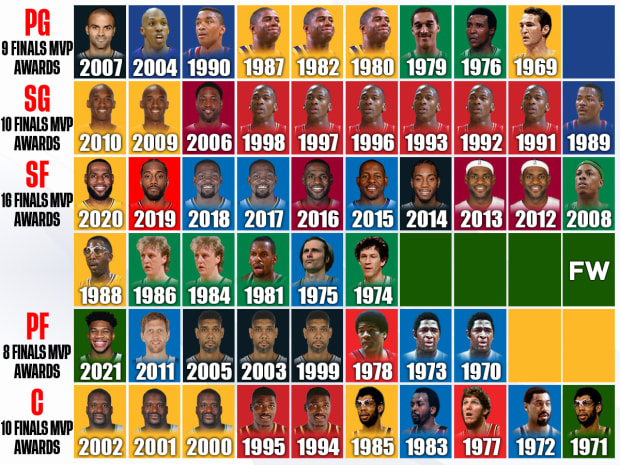
Winning an NBA Championship is possibly the greatest achievement in the world for an NBA player. After all, it is the eternal goal of every athlete who comes into the league wanting to make a name for themselves. It is also the most difficult task to accomplish because the path to the title is a long and exhausting one.
It takes something special to be a champion, and only one team out of thirty gets to experience this every single year. What is equally as impressive, on an individual level, is the stand-out player during a Finals series where an NBA Finals MVP is crowned. Since the 1969 Finals, we have seen an NBA Finals MVP every year.
Very few players have managed to achieve this incredible feat, and it is time to list all the NBA Finals MVP winners per position. By the end of the article, one position might stand out because 9 out of the last 10 NBA Finals MVP have been natural small forwards.
Point Guards - 9 NBA Finals MVP Awards
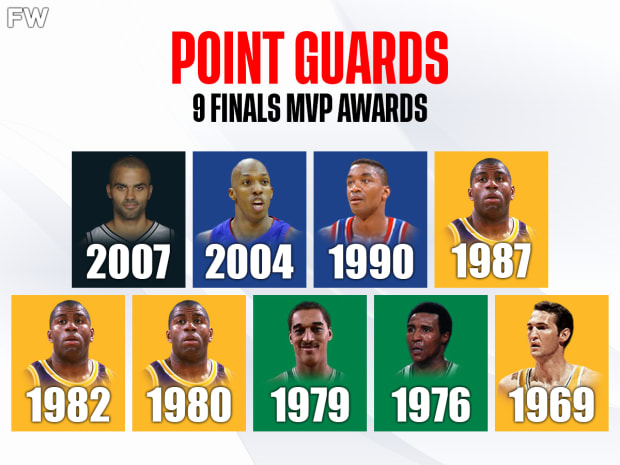
Players who won: Jerry West (1969), Jo Jo White (1976), Dennis Johnson (1979), Magic Johnson (1980), Magic Johnson (1982), Magic Johnson (1987), Isiah Thomas (1990), Chauncey Billups (2004), Tony Parker (2007)
The point guard position is often the most difficult role to occupy because leading a team’s offense every time down the floor is stressful and tiring. That is why only 9 players have managed to earn Finals MVP, with the great Magic Johnson winning 3 of them. The first to do it was Jerry West, the Lakers legend who actually lost the series against the Celtics but put up 37.4 PPG over 6 games.
Jo Jo White won Finals MVP in 1976, leading the historically great Boston Celtics to a championship victory over 6 games. White posted 21.7 PPG, 4.3 RPG, and 5.8 APG which overcame Alvan Adams and the Phoenix Suns. Dennis Johnson would represent the Seattle SuperSonics in 1979, averaging 22.6 PPG and 6.0 APG.
It is a fact that no point guard won as many Finals MVPs as Magic, and quite frankly, no point guard has come close to the legend’s dominance as a player. Magic won his first Finals MVP in 1980, averaging 21.5 PPG, 11.2 RPG, and 8.7 APG. Magic and the Lakers completed a sensational 6-game victory after Kareem Abdul-Jabbar would miss Game 6 despite putting up 33.4 PPG, 13.6 RPG, and 4.6 BPG. With Kareem out, Magic started at center as a rookie and won the series which earned him Finals MVP.
Two years later, Magic would win Finals MVP by defeating the 76ers by posting averages of 16.2 PPG, 10.8 RPG, and 8.0 APG. Magic was only 5th in his team in his scoring in the Finals but led his team in rebounds. It took 5 years before Magic would win his 3rd and last Finals MVP, completing a 6-game victory over Larry Bird and the Boston Celtics.
The great Isiah Thomas won Finals MVP in his second straight championship victory, posting 27.6 PPG and solidifying himself as one of the game’s greatest players. Chauncey Billups was next up, acting as the greatest leader at his position to catapult the Detroit Pistons over the Los Angeles Lakers. Billups and the Pistons were massive underdogs but somehow got the job done through teamwork and defense. Lastly, Tony Parker earned Finals MVP by posting 24.5 PPG and leading the Spurs past LeBron James and the Cleveland Cavaliers.
Shooting Guards - 10 NBA Finals MVP Awards
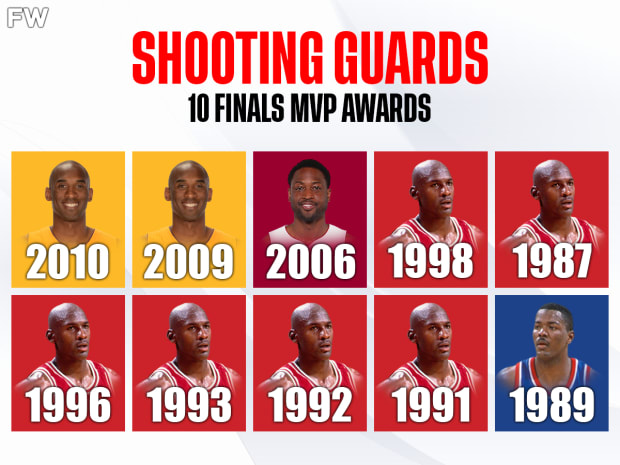
Players who won: Joe Dumars (1989), Michael Jordan (1991), Michael Jordan (1992), Michael Jordan (1993), Michael Jordan (1996), Michael Jordan (1997), Michael Jordan (1998), Dwyane Wade (2006), Kobe Bryant (2009), Kobe Bryant (2010)
Joe Dumars was the first shooting guard to win Finals MVP, leading the “Bad Boy Pistons” past the Los Angeles Lakers in a sweep. Despite a valiant effort from James Worthy (25.5 PPG), the Pistons were a much better team and won the first of their back-to-back titles.
Amazingly, Michael Jordan won 6 Finals MVPs with the Chicago Bulls. Regarded as the greatest player to ever play the game, Jordan would win the award 6 times over two 3-peats. The first 3-peat occurred in the early 1990s, where a rookie Jordan averaged 31.2 PPG to overcome the Lakers. The following season, Michael dropped 35.8 PPG in the Finals to overcome Clyde Drexler and the Trail Blazers.
Facing the NBA's MVP in Charles Barkley and the Phoenix Suns, Michael Jordan dropped 41.0 PPG and 8.5 RPG to overcome a very strong Western Conference side. After a brief retirement, Jordan would continue where he left off by winning Finals MVP in his first full season back. Defeating Gary Payton, Shawn Kemp, and the SuperSonics was not easy but the job was done. For 2 straight years, Jordan averaged over 32 PPG to overcome Karl Malone, John Stockton, and the Utah Jazz. Michael is simply the GOAT and his resume speaks for itself.
Dwyane Wade completed arguably the most incredible Finals MVP performance in 2006 by coming back from 0-2 to defeat the Dallas Mavericks led by their MVP, Dirk Nowitzki. Wade averaged 34.7 PPG, 7.8 RPG, and 3.8 APG to basically carry the Heat to a championship in his greatest accomplishment.
Of course, Kobe Bryant would win 2 straight MVPs in 2009 and 2010. After winning 3 championships alongside Shaquille O’Neal, Bryant would capture his first Finals MVP in 2009 by averaging 32.4 PPG in a victorious effort over the Orlando Magic. The following season, Bryant would overcome a poor shooting Game 7 night to win championship #5 and his second Finals MVP by posting 28.6 PPG and 8.0 RPG.
Small Forwards - 16 NBA Finals MVP Awards
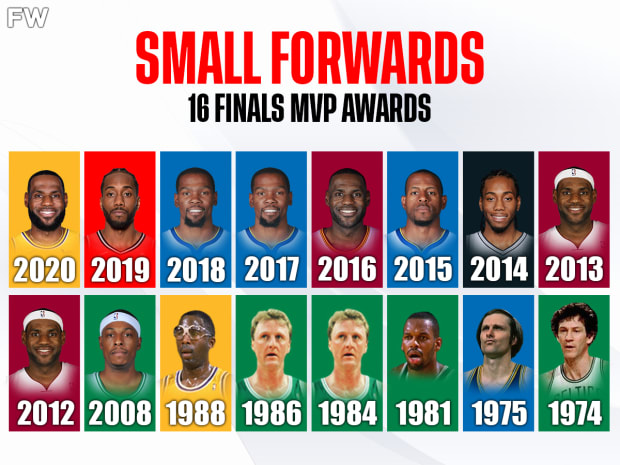
Players who won: John Havlicek (1974), Rick Barry (1975), Cedric Maxwell (1981), Larry Bird (1984), Larry Bird (1986), James Worthy (1988), Paul Pierce (2008), LeBron James (2012), LeBron James (2013), Kawhi Leonard (2014), Andre Iguodala (2015), LeBron James (2016), Kevin Durant (2017), Kevin Durant (2018), Kawhi Leonard (2019), LeBron James (2020)
Small forwards have proven to be the most effective players in the game, mainly because of their size and skillsets. A superstar small forward is large enough to have a physical impact on the game while remaining mobile enough to handle the ball, score, and play defense. That is why 16 small forwards have been Finals MVPs, starting with John Havlicek.
The Celtics legend captured his Finals MVP in 1974 by putting up 26.4 PPG to overcome 32.6 PPG by Kareem Abdul-Jabbar and the Bucks. Next season, Rick Barry captured the Finals MVP averaging 29.5 PPG to lead the Golden State Warriors over the Washington Bullets in a sweep. 6 years later, the Celtics would win another championship thanks to a small forward named Cedric Maxwell. Maxwell averaged 17.7 PPG and 9.5 RPG to lead Boston past Moses Malone and the Houston Rockets.
The Larry Bird era started in 1984, as the legend averaged 27.4 PPG and 14.0 RPG to lead the Celtics over Magic Johnson, Kareem Abdul-Jabbar, and the Lakers in 7 games. Bird would win a second Finals MVP two seasons later, overcoming Hakeem Olajuwon and the Houston Rockets. James Worthy, the Lakers superstar, won Finals MVP one season after Magic won it with the Lakers. Worthy put up 22.0 PPG and 7.4 RPG in a 7-game series against the Detroit Pistons, a performance worthy of his moniker “Big Game James”.
Paul Pierce delivered another NBA championship to the Celtics, leading out the likes of Kevin Garnett and Ray Allen to a dominating Game 6 victory over Kobe Bryant and the Lakers. With his leadership and clutch performances (including a “fake” injury to steer momentum in Game 1. 4 years later, LeBron James would get over the hump and win his 1st championship and Finals MVP thanks to a dominating display over the Thunder in 2012.
The Heat would go back-to-back, as James averaged 25.3 PPG including a 34-point performance in Game 7 to overcome the dynasty San Antonio Spurs. Quite possibly his best Finals in a Heat uniform, James showcased his true all-around game. It was the Spurs who would exact revenge in 2014, as a 23-year old Kawhi Leonard would capture Finals MVP to kickstart his superstardom in the league.
The following season, Andre Iguodala captured Finals MVP by “limiting” LeBron James to 35.8 PPG and also averaging the second-highest PPG for the Warriors. An unlikely Finals MVP, it was Iguodala who helped his team’s defense enough to overcome the Cavaliers. Once again, a small forward would win Finals MVP in 2016 and this time, it was LeBron James. The King got his revenge, completing the greatest Finals comeback ever as he led the Cavaliers past the Warriors in 7 games.
Once Kevin Durant joined the Warriors, it was game over for the league. The former Thunder man won back-to-back Finals MVPs averaging 35.2 PPG and 28.8 PPG respectively, defeating his rival LeBron James in consecutive Finals appearances. Kawhi Leonard would earn his second Finals MVP in 2019, averaging 28.5 PPG and 9.8 RPG to lead the Toronto Raptors to their first-ever championship by defeating the injury-ridden Golden State Warriors in the Finals.
Finally, LeBron James would add his 4th Finals MVP to his resume by winning his 4th championship with his 3rd franchise. The Lakers had James and a prime Anthony Davis, taking advantage over a Covid-shortened season to win it all. This marked the 9th straight time the Finals MVP was a small forward.
Power Forwards - 8 NBA Finals MVP Awards
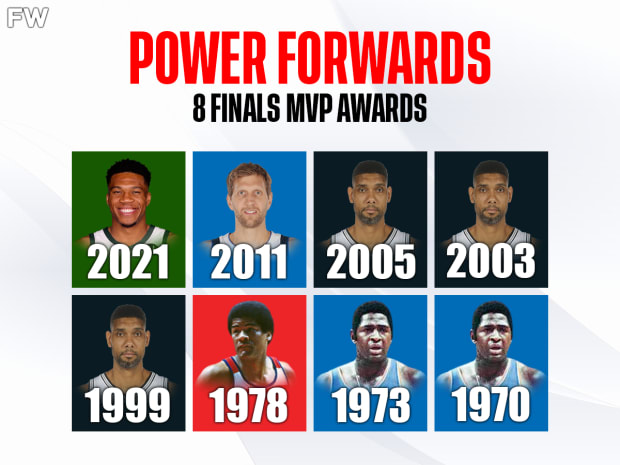
Players who won: Willis Reed (1970), Willis Reed (1973), Wes Unseld (1978), Tim Duncan (1999), Tim Duncan (2003), Tim Duncan (2005), Dirk Nowitzki (2011), Giannis Antetokounmpo (2021)
The power forward position is often underappreciated, but some of the best players ever have occupied this position. The first power forward to ever win Finals MVP was New York Knicks legend Willis Reed who averaged 23.0 PPG and 10.5 RPG in a 7-game series against the Lakers. Reed did it again in 1973, defeating the Lakers in 5 games while proving to be a dominant two-way player in the series.
Wes Unseld, one of the game’s greatest 75 players, averaged 9.0 PPG and 11.7 RPG to catapult the Washington Bullets over the Seattle SuperSonics in 7 hard-fought games. Despite averaging under 10 PPG, Unseld was a force on both ends of the floor and earned his award. Of course, Tim Duncan would go on to win 3 Finals MVPs as a member of the San Antonio Spurs dynasty.
The first came in 1999, as Duncan was given the keys to the team by David Robinson. Duncan averaged 27.4 PPG and 14.0 RPG to overcome Latrell Sprewell and the Knicks in the Finals, winning his first championship in 5 games. Four years later, Duncan put up an incredible 24.2 PPG and 17.0 RPG to defeat Jason Kidd and the Nets in 6 games. The third one came in 2005, with Duncan averaging 20.6 PPG and 14.1 RPG in a 7-game series against the 2004 champions Detroit Pistons.
Dirk Nowitzki marked the greatest achievement of his career when he won Finals MVP in 2011 to lead the Dallas Mavericks past the Miami Heat in 6 games. Despite coming up against LeBron James, Dwyane Wade, and Chris Bosh with the Heat; Nowitzki was unstoppable on offense to deliver the first championship to the Mavericks.
Last season, The Greek Freak Giannis Antetokounmpo won Finals MVP thanks to a terrific 50-point performance in Game 7 against the Phoenix Suns. Giannis placed his name among the top-30 players ever with this performance, and he has more to come as he is only 26 years old.
Centers - 10 NBA Finals MVP Awards
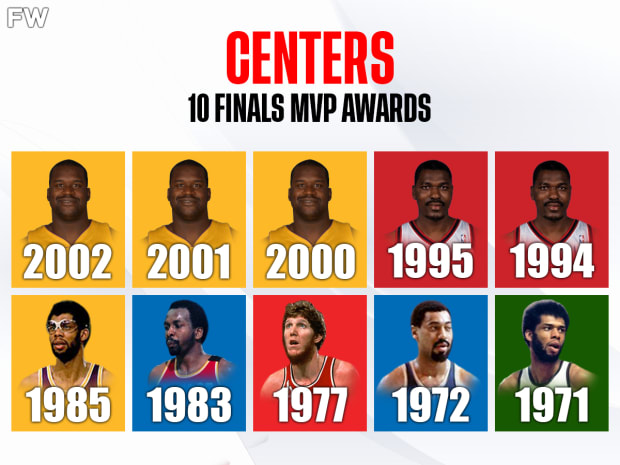
Players who won: Kareem Abdul-Jabbar (1971), Wilt Chamberlain (1972), Bill Walton (1977), Moses Malone (1983), Kareem Abdul-Jabbar (1985), Hakeem Olajuwan (1994), Hakeem Olajuwon (1995), Shaquille O'Neal (2000), Shaquille O'Neal (2001), Shaquille O'Neal (2002)
Centers, especially in the older days, are regarded as the most dominant players in the NBA. Their sheer size and ability around the rim is the main reason big men have dominated the NBA for the majority of the league’s history, although the game has greatly changed over the past decade. Arguably the greatest big man ever, Kareem Abdul-Jabbar won his first Finals MVP in 1971 by leading the Milwaukee Bucks past the Baltimore Bullets in 4 games.
The following season, Wilt Chamberlain won Finals MVP averaging 19.4 PPG and 23.2 RPG to lead the Los Angeles Lakers past the Knicks in 5 games. That was interestingly Wilt’s first and only Finals MVP because the award was not given out in 1967 (Chamberlain’s first championship).
One of the most dominant displays by a big man came courtesy of Bill Walton in the 1977 Finals, as the Trail Blazers superstar dropped 18.5 PPG, 19.0 RPG, and 5.2 APG. He completely took over the Finals and that is why Walton was named among the top-75 players ever. Moses Malone, arguably the greatest offensive rebounder ever, averaged 25.8 PPG and 18.0 RPG to lead the 76ers past the Lakers in a convincing sweep.
Kareem won his second Finals MVP (with his second team) in 1985, averaging 25.7 PPG and 9.0 RPG to boost the Lakers past Larry Bird and the Celtics in 6 hard-fought games. With Michael Jordan retired for 2 seasons, Hakeem Olajuwon was the undisputed best player in the league en route to 2 straight championships in 1994 and 1995. Armed with the “Dream Shake” and a core of solid role players, Olajuwon had a dominant 2-year run in the NBA.
After Hakeem, Shaquille O’Neal’s dominance in the NBA began. The Diesel won his first Finals MVP in 2000, averaging 38.0 PPG and 16.7 RPG to dominate Reggie Miller and the Pacers in 6 games. Shaq did it again in 2001, averaging 33.0 PPG and 15.8 RPG to boost the Lakers to their second-straight championship at the expense of the 76ers. Finally, Shaq captured his 3rd straight Finals MVP in 2002 by averaging 36.3 PPG and 12.3 RPG to lead the Lakers over the Nets. Quite simply, since Wilt Chamberlain, there hasn’t been a more dominant physical specimen than Shaquille O’Neal.
Post a Comment
0 Comments